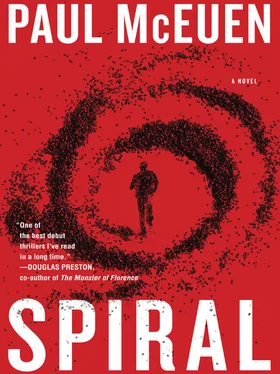Jake had promised Dylan the moon. “I’ll get your mom. I’ll bring her back. We’ll get through this.” He tried to believe it as he said it, so that Dylan would believe it, too. “Hang in there, little guy.”
The doctor was ready with a hypodermic. They planned to sedate Dylan as soon as Jake left. It was the only thing they knew to do. It took all Jake had to hold back the darkness. He had never in his life felt so powerless.
Jake was haunted by a truth he’d been circling for months. More than anything he’d wanted since the war, he wanted a life with Maggie and Dylan. He couldn’t picture any other future. But his fantasy was shattered before it came close to coming true, replaced by a reality where Maggie was Orchid’s prisoner, Dylan was gravely ill, and all Jake could do was chauffeur an old war criminal to his death.
He tried to shake it off. He was beat up, adrenaline-burnt, but itching for action. The combination of frustration, anger, and anxiety made him dangerous, possibly prone to mistakes. Every soldier knew that danger the way he knew his rifle. Unreleased pressure ate at you, chewed you up. Jake had seen it, the slow, creeping toll of unreleased pressure. Months in the desert, staring across the sand, waiting to kill or be killed, putting on the damned bioweapons suits, taking them off again. It was a relief when the final orders came down and they were moving. Once that happened, the air changed. Everything was sharp, like a knife, the contrast suddenly turned up. You could do anything.
“THERE IS A CRISIS,” KITANO SAID SUDDENLY, JUST AFTER they left the town of Hammond, a few miles from the Canada border.
Jake jumped so hard he swerved. The back wheels slipped before catching the road again. The road was empty, nothing but forest on either side. He hadn’t seen another car for a couple of miles. “What’re you talking about?”
“In Japan. A crisis with the men. Approximately two-thirds of the young men. They have become soshoku-danshi .”
“I don’t know what that means.”
“ Soshoku-danshi . Herbivorous males. Grass-eating men.” Kitano shook his head. “They are soft. Weak. No longer interested in war. They are not even interested in women. They garden. And buy trinkets for their homes. A marketing report from Matsushita maintains that forty percent of them sit down when they piss.”
Kitano went silent. Jake glanced over. The old man’s face was drawn, eyes narrowed. His hands scratched at his skin. Kitano said, “The Japanese defense ministry is calling it a crisis. The grass-eaters are taking over, and soon there will be no men left to fight. The ministry is forced to spend billions developing robots that will fight to defend Japan.” He glanced at Jake, his jaundiced eyes dark. “I am ashamed to be Japanese.”
Jake turned back to the road. An old police cruiser sat in the driveway of a shuttered bait shop to his right, unoccupied. He felt Kitano’s gaze like a shadow on him. “It’s a phase. A fad. Next year they’ll all be taking up kickboxing.”
“No. You are wrong. It is not a phase. It’s the war.”
“What war?”
Kitano smirked. “What war? The only war. Not these skirmishes you have now. They are children’s games.”
The sky overhead was slate-gray. Everything was old, the houses, the cars they passed. A cellphone tower peeked above the trees on a nearby hillside, the only evidence that they were not in some kind of time warp, taken back two decades.
The only war . World War II. The last full-on, all-out, winner-take-all struggle for survival. A war where the most powerful nations in the world fought for their lives. Not a strategic skirmish. No arguments about dominoes or oil. A war of survival. The world had seen nothing like it since.
The war had left its mark on America. Given America the swagger, the confidence to rule the world for more than half a century. Japan had experienced the other side, what it felt like to be conquered.
Jake pulled up to an intersection with a four-way stop sign. No other cars were in sight. “That was a long time ago,” he said.
Kitano shook his head. “A few decades are nothing for Japan. We are a nation that does not forget easily. We are held together by our memories.” He closed his eyes. Jake could see stains growing around the armpits of Kitano’s shirt. The guy was scared to death.
“After the war,” Kitano said, “we were nothing. The Americans emasculated us. They defiled the emperor, made him a man. They imposed their laws, re-created Japan in America’s image. They even confiscated our fighting swords. To keep our traditions alive, we fought with blunt, dull metal.” Kitano smirked, spat on the floor. “They would have us be children.” Kitano returned to his scratching, hands working furiously. Red streaks appeared on his arms. If he scratched any harder, he’d draw blood.
“Take it easy,” Jake said. “You all right?”
Kitano stopped suddenly, tilted his head, listening carefully. “Do you hear that? The sound? Like a steady knocking?”
Jake listened. The road was two lanes, poured concrete laid down in sections, with seams between the sections. The tires made a repetitive knocking noise as they passed over. “What about it?”
“How much did they tell you about me?”
“Enough.”
“I was no great warrior. I was a technician. An engineer. Like you, Jake. You drove bulldozers, correct?”
Startled, Jake asked, “Who told you that?”
Kitano ignored the question. “There is a story I will tell you. Not my own. A tale told to me by one of the other Tokkō. He said he would hear a sound. He even described it as the sound of tires on a road. Regular. Thump, thump, thump . The Tokkō. They were to travel to the United States, carried by some of the last remaining submarines in the Japanese fleet. They were to attack with the Uzumaki. These were the most important men in Japan, proudly serving the emperor. They were selected from existing Tokkō squads. Chosen for their dedication. Do you understand?”
“No.”
“Seigo Mori and I were both from the University of Tokyo. Almost all of the kamikaze were from the University of Tokyo. The best and the brightest. The soldiers would come and line us up. ‘Who will volunteer?’ they would ask. ‘Who will sacrifice for Japan?’ Seigo was a French literature major. He was a romantic. He stepped forward.
“Seigo was assigned to Tokkō Squad 232. His kamikaze squadron was ordered to attack the Americans at Okinawa. They were all young, flying dreadful planes, dregs left over after everything valuable was shot down. He had on his senninbari , a belt stitched by the hands of a thousand women. His mother sat on a street corner for days to get the necessary hands. He also had his hanayome ningyo , his bride doll.”
Jake tried to follow what Kitano was saying, but he kept jumping around, barely making sense.
“Seigo left a letter addressed to his older sister, describing his last day. I read it later, in 1954. She showed it to me. His squadron, the letter said, had spent the previous night at a tea house, drinking and smiling and laughing. In the morning they faced their hometowns and sang patriotic songs. Though they all had been racked with doubts, all uncertainty vanished as they taxied their planes down the runway. The local girls came out, waved cherry blossom boughs. Sent them on their journey. They were to die, they were proud. They were the only hope.
“Seigo said he was happy. He said he was alive in a way he had never been before. He longed to fly into the arms of death, on a mission to save his country. ‘To save my father and mother, my sister from the white devils.’
“They took off after dawn. Then Seigo heard it, coming from the front of the plane, the thumping. His heart sank. It was the engine. He’d been carefully attending to it for a week, trying to make it run on the terrible fuel that they were given. He tried, but in truth he was doomed from the beginning. The plane would not make it the last hundred and fifty miles to the target. It would be lucky to make it back to the base.
Читать дальше












